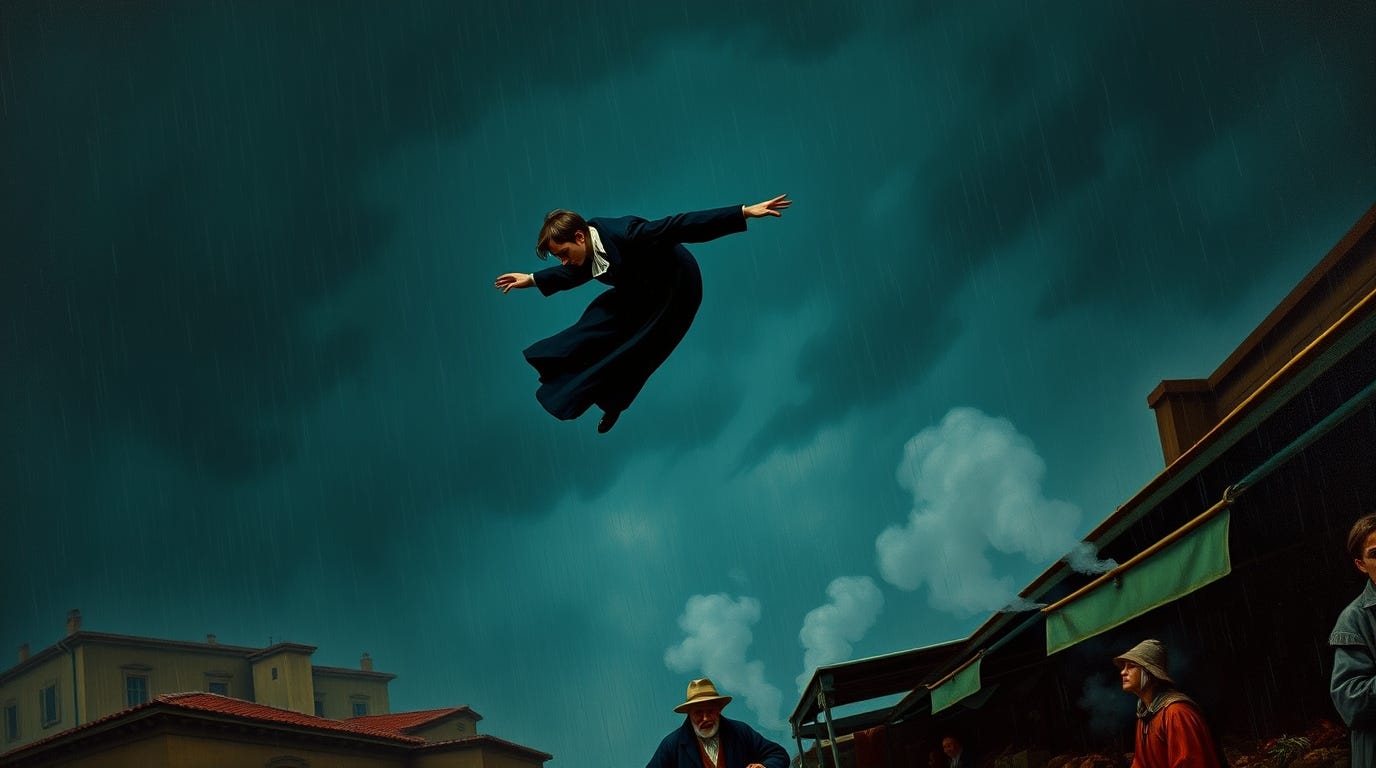Giacomo Leopardi and Naples: Reflections and Insights
Connection between writings and lived experience of an extraordinary thinker
Being born and raised in Naples means living among history, culture, and contradictions, where everything merges into a unique experience. Reading some of Leopardi's works, I tried to imagine how his thoughts might have dialogued with my city.
I have deepened my study of Leopardi's writings, from his early works to those completed during his stay in Naples, and some texts have particularly struck me. I wondered how his thoughts confronted the Neapolitan reality. This exercise in imagination is based on the connections I found between his reflections and his experience in the Parthenopean city.
"Il Discorso sopra lo stato presente dei costumi degl'italiani" ["Discourse on the Present State of Italian Customs"]: the lens of social criticism
"Il Discorso sopra lo stato presente dei costumi degl'italiani" offers a merciless snapshot of the society of the time, an X-ray of its moral and civil weaknesses. Leopardi does not spare criticism of corruption, indolence, superficiality, and excessive attachment to material pleasures that characterized, in his opinion, Italian society. This text, written in 1824, serves as a lens through which Leopardi observes Neapolitan reality, which, with its exuberant vitality and propensity for "gluttony" and lust, could appear to him as an emblematic example of this decadence.
In Naples, this criticism becomes even more incisive, as Leopardi finds himself facing a reality where the pursuit of pleasure and ostentation of wealth coexist with misery and degradation. The hedonistic attitude of Neapolitans, their passion for food, festivals, and worldly life, could appear to Leopardi as an escape from reality, a sort of anaesthetic in the face of life's sufferings. However, it's important to emphasize that Leopardi did not limit himself to moralistic condemnation. His gaze was deeper and more complex. He understood that attachment to earthly pleasures could be a reaction to suffering and the precariousness of existence, a search for consolation in a world dominated by pain and death. This awareness, in my opinion, makes his criticism more lucid and more human and understanding.
"I Paralipomeni della Batracomiomachia" ["The War of the Frogs and Mice: Additional Cantos"]: the weapon of irony
"I Paralipomeni della Batracomiomachia" represent a powerful weapon in Leopardi's hands: irony. This work, written during his Neapolitan stay but with earlier roots, is a mock-heroic poem that parodies the epic genre. Through parody, Leopardi ridicules human vices and weaknesses, with a gaze that is both critical and amused. One imagines Leopardi who, while not fully sharing the Neapolitan lifestyle, also grasped its picturesque and sometimes grotesque aspect, finding in it material for his satire. This ability to observe reality with ironic detachment, to unmask its contradictions through laughter, is a fundamental key to understanding his relationship with Naples.
The irony of "I Paralipomeni" is not an end but mere entertainment. It is a tool of analysis, a way to highlight the inconsistencies of the world and the vanity of human aspirations. In Naples, this irony takes on new nuances, becoming almost a form of defence against a reality that, though fascinating, often appeared chaotic and contradictory to him. One imagines Leopardi who, witnessing the disputes between the characters of the poem, found echoes of the discussions and controversies that animated Neapolitan cultural life, transforming them into a sort of tragicomedy.

Irony, therefore, is not just a stylistic feature of "I Paralipomeni", but a true lens through which Leopardi observes the world, particularly Naples. It is a way to distance himself from a reality that attracts and repels him, to express his disenchantment without giving up a subtle form of humour. One imagines Leopardi who, while writing his satirical verses, smiled bitterly at human weaknesses, finding a form of consolation and understanding in that smile.
Video by Author
"47 Cervi, bufali, scimmie, orsi e cavalli,
ostriche, seppie, muggini ed ombrine,
oche, struzzi, pavoni e pappagalli,
vipere e bacherozzi e chioccioline,
forme affollate per gli aerei calli
empiean del tetro loco ogni confine,
volando, perché il volo anche è virtude
propria dell'alme di lor membra ignude."
["47 Deer, buffaloes, monkeys, bears and horses,
oysters, cuttlefish, mullets and umbrella fish,
geese, ostriches, peacocks and parrots,
vipers and beetles and small snails,
crowded forms through the aerial paths
filled every border of the dark place,
flying, because flight is also a virtue
proper to souls stripped of their limbs."]
Reading these verses from the episode of Daedalus and Leccafondi within "I Paralipomeni", I cannot help but think of Naples. The oysters and mullets take me straight to the alleys of Pignasecca, to the smell of the sea and the cries of fishmongers. The peacocks and parrots? I see them in the courtyards of noble palaces, where even today one breathes an air of ancient elegance. And these "aerial paths" crowded with souls remind me of our alleys that climb toward the sky, where everything mingles: misery and nobility, sacred and profane. It's as if Leopardi had captured the soul of Naples in this liberating flight, where every creature, finally light, dances between heaven and earth.
The relationship with nature: from benign to stepmother, to indifference
Leopardi's relationship with nature is complex and continuously evolving. From an initial vision of a benign nature, a source of illusions and consolation, he moves to a perception of nature as a stepmother, indifferent to human destiny. In Naples, this conception takes on new nuances, assuming even more dramatic contours. The imposing presence of Vesuvius, the frequent seismic tremors, and the city's history marked by eruptions and earthquakes offer Leopardi tangible evidence of nature's destructive power. But it is especially the experience of cholera, which struck Naples during his stay, that profoundly marked his vision.
Cholera, with its inexorable spread and countless victims, became for Leopardi the definitive proof of nature's indifference toward human destiny. A blind and implacable force that struck without distinction, taking away young and old, rich and poor. This tragic experience, lived firsthand in Naples, helped consolidate his vision of nature as not only a stepmother but also profoundly hostile. "Il Dialogo della Natura e di un Islandese" ["Dialogue between Nature and an Icelander"], with its representation of nature impassive to human suffering, finds in Naples a tragic and concrete confirmation. Illness and death, so present in Neapolitan life of the time, become for Leopardi metaphors of the human condition, marked by precariousness and pain.
Fragility
The experience of cholera in Naples not only reinforced Leopardi's pessimistic vision of nature but also influenced his reflection on the human condition. The fragility of existence, the brevity of life, and the absurdity of pain, become central themes in his subsequent work. Cholera, therefore, was not just a contingent event, but an experience that profoundly marked his thought and poetics. Nature, from a source of illusions, definitively transforms into a destructive force, indifferent to human destiny, a force that manifested itself with particular violence in Naples.
Particularly during his stay in Torre del Greco in 1836 at Villa Ferrigni (now Villa delle Ginestre), this conception takes on new nuances. The daily view of Vesuvius from his dwelling, the occasional seismic tremors, living at the foot of this natural force both fascinating and threatening, might have fueled his reflections. It is not coincidental that here he composed "La ginestra" ["The Broom"], where the flower growing on the slopes of the volcano becomes a symbol of human resistance in the face of nature's indifference.
A Neapolitan seeking to understand Leopardi
For me, as a Neapolitan, confronting Leopardi's gaze upon my city means exploring a complex and multifaceted image. It means observing Naples through a particular lens, that of an intellectual who perhaps found here new insights for his reflections on humanity and the world. And perhaps Naples itself, with its vitality, passions, and contradictions, may have contributed to enriching his thought with new nuances.
"Caggiono i regni intanto, passan genti e linguaggi: ella nol vede; e l'uom d'eternità s'arroga il vanto"
["Meanwhile kingdoms fall, peoples and languages pass: she sees it not, and the man claims for himself the boast of eternity"]
These verses from "La ginestra" do not just reflect an indifferent nature but embody a broader truth about the human condition. The illusion of our centrality in the universe, the presumption of our eternity, shatters against this Leopardian awareness, which paradoxically, instead of paralyzing us, pushes us toward a more lucid understanding of reality.
Rereading Leopardi means confronting a gaze that transcends time and space. His Neapolitan experience, with its contradictions and intensity, becomes a paradigm for a broader reflection on the human condition. His thought still invites us today to overcome consolatory illusions and look at the world with the same intellectual acuity that allowed him to grasp the universal questions of existence in the most concrete manifestations of daily life.
Feel free to leave a comment.
I have woven tales for anyone who cares to read them. My books await you on Google Books. You can also check out my stories on Medium.com.
I am eager to participate in research and produce content on Cross-Cultural Philosophy. Considering the many philosophy professors following Learn Vedanta Substack from universities across the five continents, I would be truly honoured to be involved in projects, as I have been recently approached. Please feel free to contact me.
I would be honoured if you considered subscribing to the Premium Contents of my Vedanta Substack and leaving feedback, comments, and suggestions on this page and by writing to me at cosmicdancerpodcast@gmail.com.





I’m curious about Giacomo Leopardi. I know he is considered one of the most prominent Italian writers of the romanticism literary movement in the 19th century. But everything I learn about him seems to counter this point. His pessimistic view of nature, labeling it destructive, his bleak take on human suffering, his irony and political discourse. What exactly about him embodied the romantic characteristics?